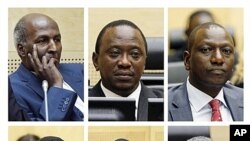The former top official of a human rights group has expressed satisfaction with the evidence the group compiled that has led the International Criminal Court (ICC) to soon prosecute accused masterminds of Kenya’s 2007 post-election violence.
Florence Simbiri-Jaoko, former chairperson of Kenya’s National Commission on Human Rights (KNCHR), denied the rights group’s work was fraught with machinations to thwart the presidential aspirations of two of the accused perpetrators.
“[Kenyans] are happy that, at least in terms of accountability, they [the accused] would be held accountable and that the court will be fair,” continued Simbiri-Jaoko. “If they are found to be involved, based on the evidence, then, hopefully, there would be a conviction; if not, then there would be acquittal. I think Kenyans are happy that the truth will come out of what really happened.”
Analysts say evidence compiled and presented to ICC prosecutors by KNHCR played a pivotal role in the case against the alleged masterminds of the post-election violence.
In its ruling Monday, The Hague-based international court ordered four prominent Kenyans to stand trial on charges they helped organize deadly post-election violence that left at least 1,300 dead and displaced more than 300,000 others.
The court said it has sufficient evidence to proceed with cases against Deputy Prime Minister Uhuru Kenyatta, former education minister William Ruto, civil service chief Francis Muthaura, and radio broadcaster Joshua Arap Sang.
Charges against former police chief Mohammed Hussein Ali and former industrialization minister Henry Kosgey were dropped after judges cited a lack of evidence to support accusations by prosecutors.
Some observers say the ruling has political implications, especially when both Kenyatta and Ruto have aspirations to represent political parties in Kenya’s presidential election this year.
Supporters of both men accuse the KNCHR of political machinations against opponents of President Mwai Kibaki and Prime Minister Raila Odinga ahead of this year’s vote. But, Simbiri-Jaoko said the rights group was impartial in the compilation of evidence during the post-election violence.
“We documented and investigated what were violations against the rights of citizens,” said Simbiri-Jaoko. “This incident was a result of political processes. So, that aside, I do not think that we did what we did because it was political. We [investigated] because violations were occurring and the natural thing for any human rights institution to do is to document them because, if we didn’t then, victims will not have any hope of justice.”
She said a majority of Kenyans seem to want the trial of the alleged masterminds to be in The Hague rather than in Kenya.
“We actually wanted the Kenyan government itself to investigate and come up with a system of prosecuting those people who are involved and the people that were said [to have been] allegedly involved were in both sides of the [political] divide,” Simbiri-Jaoko said. “Anybody who has read our report can see clearly our report covered the violence in its full breadth and our recommendation was very clear.”




